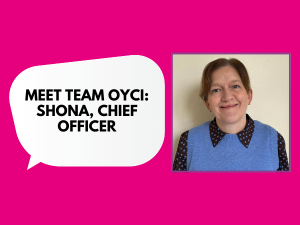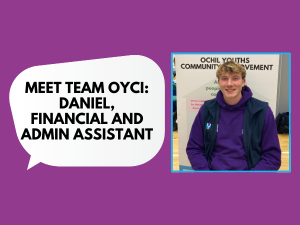Safe & Sound
Child Protection Policy Statement
OYCI is fully committed to promoting children’s rights, notably their right to be protected from harm, abuse and exploitation and to be involved in any decisions that directly affect them. OYCI has a duty of care to implement effective policies and procedures for safeguarding the welfare of children and young people. In order to achieve this we will ensure our staff and volunteers are carefully selected, screened, trained and supervised. Furthermore we will endeavour to keep up to date with national developments relating to the care and protection of children and young people.
OYCI will:
- Ensure that all workers understand their legal and moral obligations to protect children and young people from harm, abuse and exploitation
- Develop best practice in relation to the recruitment of all workers (paid staff and volunteers)
- Provide opportunities for all newly appointed workers (paid and unpaid) through the provision of induction training, which gives an overview of the organisation’s purpose, values, structure and services
- Ensure that all workers understand their responsibility to work to the standards and procedures detailed in the organisations Code of Conduct and Child Protection procedures
- Ensure that all workers understand their obligations to report care or protection concerns about a child/young person, or a workers conduct towards a child/young person, to the organisation’s designated person for child protection
- Ensure that all procedures relating to the conduct of workers are implemented in a consistent and equitable manner
- Ensure that the designated child protection officer understands his/her responsibility to refer any child protection concerns to the statutory child protection agencies (i.e. police and/or social work)
- Ensure that the organisation meets all its responsibilities in adhering to the requirements of the Protection of Vulnerable Groups (PVG) Act 2007
- Provide opportunities for all workers (paid and unpaid) to develop their skills and knowledge particularly in relation to the care and protection of children and young people
- Ensure that children and young people are enabled to express their ideas and views on a wide range of issues and will have access to the organisation’s complaints procedures
- Endeavour to keep up to date with national developments relating to the care and protection of children and young people
Child Protection Procedures
Section 1 – Introduction
- OYCI is committed to providing a safe environment for young people. This Child Protection Policy and Procedures reflects this commitment and aims to ensure that all concerns about the care and protection of children and young people are effectively managed
- The OYCI Trustees are responsible for developing and reviewing the organisation’s Child Protection Policy statement and other care and protection policies and guidelines. However, all workers (paid or unpaid) for OYCI are required to implement the child protection procedures
- Section 5 of the Children (Scotland) Act 1995 states that “it shall be the responsibility of a person who is 16 or over and who has care and control of a child under 16, to do what is reasonable to safeguard the child’s health, development and welfare”. This places on OYCI a Duty of Care for the children and young people we work with. OYCI also recognizes that all children and young people have the right to freedom from abuse as outlined in the UN Convention of Rights of the Child. OYCI will constantly strive to provide a safe environment, free from any forms of abuse, for all the young people in its care. OYCI understanding of abuse can be found in Appendix 2
- OYCI has a commitment to children’s rights, notably their right to be protected from harm, abuse and exploitation and to be involved in any decisions which directly affect them
Section 2 – Recruitment
OYCI recognises that appropriate recruitment and selection procedures are a vital part in developing and maintaining a safe environment for children and young people. The following procedures are in place to ensure that only suitable applicants are accepted as volunteers or staff of OYCI in young person facing roles. Some administrative/back office roles may not be considered ‘regulated work and therefore will not require PVG, these will be considered on a case by case basis:
- All applicants (staff and volunteers) will be asked to complete an application form or send in a CV and covering letter
- All applicants (staff and volunteers) will be asked to complete a self declaration form
- All successful applicants (paid and unpaid positions) will be asked to provide suitable references
- All suitable applicants (paid and unpaid positions) will be asked to attend an interview
- A self declaration form will be used so that interviewed applicants can declare and discuss any convictions (and their context) with the organisation
- All successful applicants appointed into a ‘regulated work’ position, as defined by the PVG Act, will be required to become members of the PVG Scheme or, if already a member, provide their PVG Scheme Record and permit access to a PVG Scheme Record Update
- Any applicant found to be fully listed on the Children’s List will not be appointed to a regulated work (paid or unpaid) position.
Section 3 – Training
All newly appointed staff and volunteers at OYCI in ‘regulated work’ positions, and Trustees, will receive training, support, information and guidance to ensure they understand their role and responsibilities with regard to Child Protection. This will include:
- Details of the structure of the organisation will be provided, including the details of overall responsibility for child protection within the organisation
- Details of the organisations aims and objectives will be provided
- An assessment of staffs (paid and unpaid) training and development requirements will be completed
- The roles and responsibilities of staff and volunteers within the organisation will be clarified
- Clear details of the expectations, roles and responsibilities of all newly appointed staff and volunteers will be provided
- All staff and volunteers must agree and sign up to the organisations Child Protection Policy and procedures
- Training, information and a copy of the organisations Code of Conduct will be provided
- The contact details and roles and responsibilities of the organisations Child Protection Officer will be provided
Section 4 – Responding to suspicion or allegation of abuse
Members of staff (paid and unpaid) have a duty to report any suspicions, allegations or disclosures to the Trustees. However, the first concern must be the reassurance of the child or young person and their protection from any potential risk. During the reporting process the young person should be protected from further contact with the individual involved in the allegation.
As a worker or volunteer your role in child protection is not to investigate or decide if abuse has taken place. Your role is to observe, record and report. The following steps (over page) should be followed in response to suspicion or allegation of abuse: Where an allegation is made against an OYCI worker (paid or unpaid), the above process still applies. A referral will be made to Disclosure Scotland if an individual harms a child or puts a child at risk of harm and as a result of this, we take the decision to remove them or they leave of their own accord, come to the end of a contract, retire or have been made redundant. The form for referral to Disclosure Scotland is available on the Government website www.scotland.gov.uk
Section 5 – Responding when a child or young person discloses abuse
It is likely that a child or young person who has been abused will have given a lot of thought as to whether they should disclose the abuse. It is highly likely that they will be nervous and afraid that they might be rejected, blamed or not believed. It is important that staff and volunteers follow the steps outlined below:
Stay calm
Remain calm and natural. You have been approached because you are trusted, not because you are an expert counsellor. Do not promise to keep the information secret; you may have to inform an appropriate person. You must take any disclosure seriously and reassure the young person that you believe them.
Listen and take the allegation seriously
Listen to what the child or young person is saying. Give them the time and opportunity to tell you as much as they are able and willing to. Do not pressurise them and allow them to disclose information at their own pace. You should not investigate, ask leading questions or ask specific or explicit questions. You should only clarify what they are willing to tell you in their own words. Try to do this in an appropriate place, such as a room where other people can see in through an open door or window. Whilst it’s important to respect the young person’s privacy it should not be at the expense of other child protection measures.
Reassure
Reassure them that you believe what they are saying and that you know it is not their fault. You should also give them some indication of what you will do next with the information that they have given you.
Confidentiality
Reiterate that you cannot promise to keep the information secret. You must take any disclosure seriously. Details of the disclosure should only be passed on to the Child Protection Officer or Trustee, who should refer the case to the appropriate authorities.
Child protection Officer: Shona Ulrichsen, tel: 07962208142
Trustee: Chairperson Christine Arjun, tel: 07807451290
Wherever possible you should try not to discuss any concerns that you have about a child or young person in a way that may lead others to suspect that they are being abused.
Record
If you are able to, make brief notes during the initial disclosure, explaining to the young person why you are doing it. If it’s not possible to do so at the time, record the details as soon as possible after the disclosure with as many facts as possible (dates, times, actual words used).
Look after yourself
Being trusted with a disclosure of abuse directly from a young person can be emotionally draining, worrying and very stressful. Whilst it’s essential that confidentially is maintained at all times, it’s important that you consider your own emotional feelings and discuss any anxieties you have with the Child Protection Officer or Trustee. If appropriate, the Child Protection Officer or Trustee will arrange additional support for you.
Child protection Officer: Shona Ulrichsen, tel: 07962208142
Trustee: Chairperson Christine Arjun, tel: 07807451290
Section 6 – Protection of Workers who report care and protection concerns
Deciding to report a colleague or volunteer you suspect of abusing or otherwise harming a child can stressful and difficult and you may be worried about the person concerned taking action against you. The law does give you protection if you raise concerns or report a colleague as long as the report was not malicious or vexatious.
Section 7 – Data Protection and management of confidential information
OYCI is committed to the safe and secure management of confidential information. All personnel information, including volunteer information, is kept digitally password controlled, or locked and can only be accessed by those that require it to carry out their role. Only relevant information is kept and this is regularly reviewed and outdated information destroyed appropriately.
OYCI is also committed to the rights of children and young people to confidentiality and this will be respected by all workers. However, where a worker feels that the information disclosed by a child or young people should be referred to their line manager for investigation by an appropriate agency, the young person should be told that confidentially cannot be kept.
Section 8 – Review of Child Protection policy and procedures
This policy and procedures document will be reviewed annually by the Trustees and all staff and volunteers will be notified of any changes.
This policy has been approved by: Christine Arjun, Chairperson
On behalf of: OYCI Trustees
Date: 1 February 2022
Signed: Christine Arjun
Appendix 1
Child Welfare Report Form
- A report should be made by the person who has had the initial concerns about a child’s welfare using this pro forma
- The report should be handed to the Child protection Officer or Trustee in a sealed envelope
- The Child Protection Officer or Trustee should contact the appropriate Social Work Dept/Police


